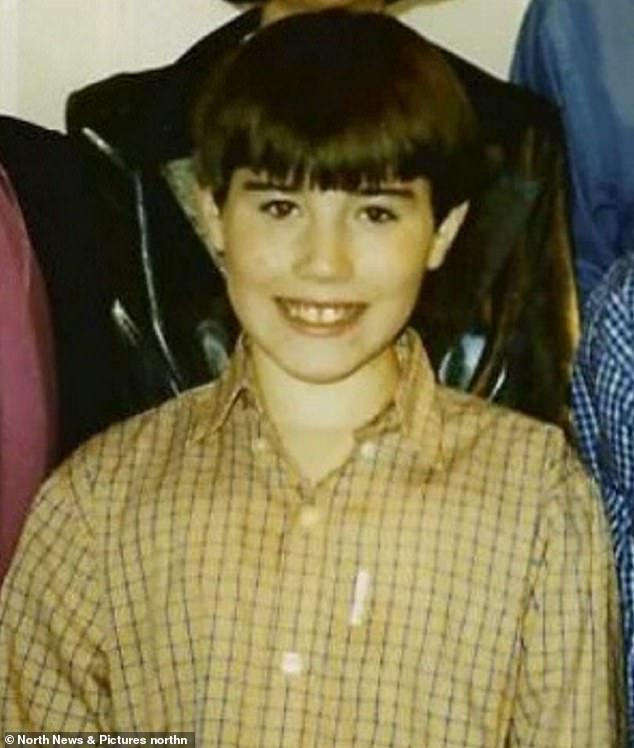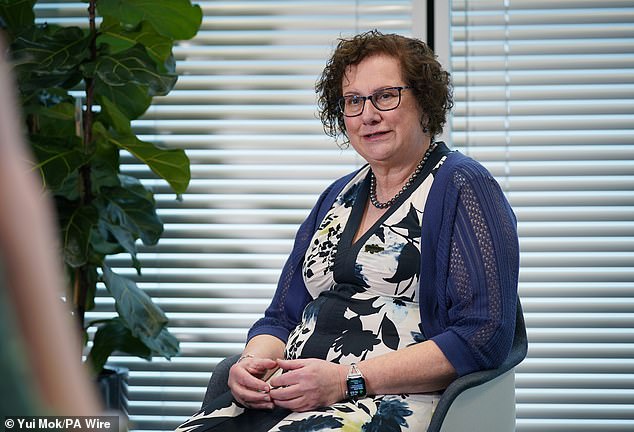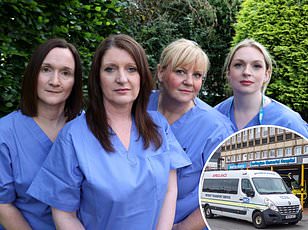‘Doctors refused to acknowledge that people like me exist who de-transition… will that finally change?’: As NHS opens clinic for patients who regret their sex reassignment surgeries, one patient hopeful speaks out
Pictured: Ritchie Herron says he was quickly referred for life-changing surgery by the NHS
Like many people who suffer from gender dysphoria, Ritchie Herron hoped that radical transgender surgery, so that his body would better match his female identity, would change his life for the better.
Instead, he is infertile, incontinent and in constant pain, and claims he has quickly made “the biggest mistake of his life.”
Ritchie, now 37 and born a male, has been living a nightmare for six years after reportedly undergoing extensive surgery ‘under pressure’ to become a woman.
He heartbreakingly described how it now takes him 10 minutes to slowly and painfully empty his bladder.
His sexual desires have been ‘killed’ and his genitals are ‘in shock’ from the damage done by an operation that was supposed to combat his gender dysphoria.
But now, after years of fighting for help, Ritchie has reason to be optimistic in recent days.
Earlier this month, the NHS announced it would launch its first service to help transgender patients like Ritchie return to the gender they were born with.
Ritchie said he couldn’t be happier with the announcement.
“I can’t wait for the clinic to open. I would use the service as soon as it’s up and running,” he said The Daily Telegraph.
‘What’s most significant about this service is that it really gives recognition to detransitioners and that’s never happened before in the NHS. It’s a huge step forward.’
However, he warned that those who want to transition will not want to go to the new NHS clinic which employs the same doctors who run the gender dysphoria services and who in some cases blame patients for getting them into this situation in the first place.
“People who have detransitioned do not want to go back to gender clinics. We need to make sure that this service is run by professionals and not influenced by these activist groups through various consultations,” he said.
Ritchie is one of the faces of the so-called detransitioners, people who regret the drastic surgeries and treatments they underwent to better fit their perceived gender identity, and who now want support for the complications they face.

Pictured: Ritchie dressed in women’s clothing and was called ‘Abby’ before his surgery
He previously told The Mail On Sunday how as a teenager he buried his homosexuality, which left him with depression, anxiety and obsessive-compulsive disorder, and used repetitive behaviour to mask his unhappiness.
Then, in his twenties, he came across the idea of gender dysphoria in an internet chat room. Older men on the forum convinced the vulnerable young man that he “had to be trans.”
After a series of relapses, he decided to seek professional help in 2012.
He was referred to a psychologist, who did not stop him from thinking he had gender dysphoria, and then to the Northern Region Gender Dysphoria Service, run by Cumbria, Northumberland, Tyne & Wear NHS Foundation Trust.
The waiting list for an appointment was long, so Ritchie was so obsessed with the idea that in March 2014 he paid for an appointment at a private gender clinic.
According to Ritchie, he was diagnosed with transsexuality after two 30-minute appointments.
A psychiatrist advised him to take medication to block his testosterone production – the first step toward gender reassignment.
He began living full-time under the name “Abby,” dressing in women’s clothing. The testosterone-suppressing drugs he was given caused him to develop breasts.
In March 2015 he had appointments at the NHS gender clinic in Newcastle.
“The first question you get there is, ‘Do you want genital surgery?'” he says. “I wasn’t sure. But I had heard that you could get therapy if you were on the waiting list for surgery, so I said yes.”
Less than six months later, in July 2015, Ritchie was referred for a vaginoplasty, an irreversible procedure in which doctors remove the male reproductive organs and create an artificial vagina.
Ritchie says he told the psychiatrist he wasn’t sure and declined the offer, but he continued with therapy anyway.
In 2017 he was referred again for surgery, which was to be performed at Nuffield Health Hospital in Brighton, but the operation was paid for by the NHS.
Ritchie again refused, but said he was told he would be dismissed from the service if he did not accept the referral.

Pictured: Ritchie Herron as a young boy

Retired paediatrician Dr Hilary Cass speaks about the publication of the Independent Review of Gender Identity Services for Children and Young People (The Cass Review)
This sent him into a “spin at the deep end,” he recalls, believing it meant his therapy, which had been a “lifeline,” would also be withdrawn.
On May 23, 2018, at 10 a.m., Ritchie was wheeled into the operating room. “I didn’t even see the surgeon,” he says. “I honestly thought, ‘I’m here now, I can’t stop it even if I wanted to.'”
For 8 days he lay in a haze of painkillers. His first thought when he regained consciousness was, ‘Oh God, what have I done?’
He’s not alone. Data obtained under Freedom of Information laws shows that at least 64 former NHS patients with gender dysphoria underwent treatment to become transgender ‘detransitioned’ between 2010 and 2020.
Although NHS England has committed to providing a detransition service when the facility can reopen, this remains unclear.
It has only committed to ‘drafting a work programme by October 2024 to explore the issues surrounding a detransition pathway’.

The NHS announced the move as part of its plans to ‘transform’ care for children with gender challenges following the publication of the Cass Review.
In this report, leading pediatrician Dr. Hilary Cass concluded that children were being pressured into a course of treatment that involved powerful drugs and drastic medical interventions.
Dr Cass said there is a lack of data on how many people detransition after gender reassignment surgery, but anecdotally this number appears to be “increasing.”
The NHS has now stated that there is no ‘defined clinical pathway’ for people who want to revert to their birth sex. A pathway will need to be developed as there is currently no guidance on how these people should be treated.
